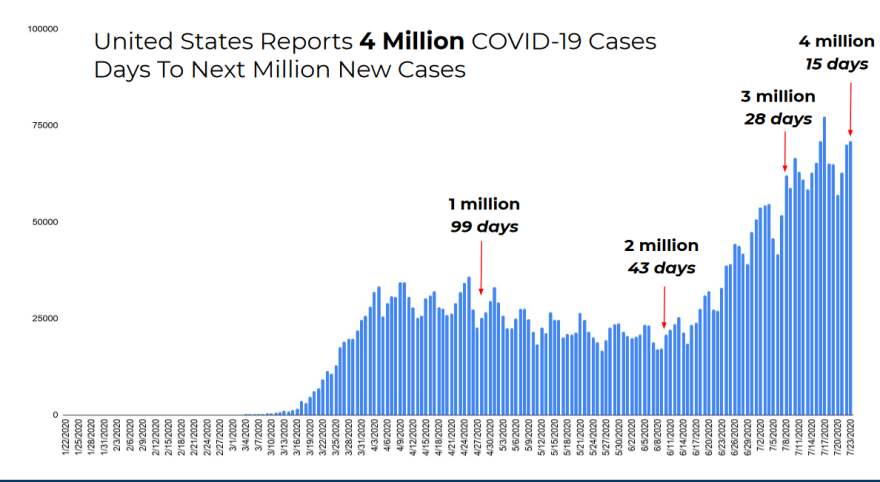Gov. Phil Scott Friday issued a statewide mandate that will require all people over 2 years old, with some exceptions, to wear facial coverings in public areas when physical distancing is not possible. The mandate will go into effect Aug. 1.
Scott had previously resisted calls to impose a mask mandate, saying the voluntary facial covering guidance issued by the Department of Health was a more effective way to suppress the transmission of COVID-19.
But Scott said during a press briefing Friday that rising coronavirus infection rates across the U.S. warrant a more forceful facial covering policy in Vermont.
“Looking at the situation in the South and West, and knowing we’ll have more people coming to Vermont, and more Vermonters inside as the weather gets colder, we need to make sure we are protecting the gains we’ve made, because as I’ve said before, we all want to keep moving forward,” Scott said Friday.
The executive order addendum issued by Scott makes Vermont the 31st state in the country to impose some form of facial covering mandate, according to an analysis conducted by Axios earlier this week, and leaves New Hampshire as the only New England state without a mask mandate.
Read the full executive order addendum here.
Scott emphasized Friday that his decision to issue the mandate does not reflect increasing rates of COVID-19 in Vermont, which currently has the lowest per-capita rate of infection in the United States.
But he said more troubling coronavirus trends nationally, including an uptick in cases in the Northeast over the past three weeks, mean Vermont needs to gird itself against a resurgence of the disease here.

“The outbreaks across the nation may be spreading back towards us,” Scott said. “And while we are in much better shape than the West and South, those states which are trending poorly, or which we are watching with caution, are inching Northeast, closer and closer to the region and therefore closer to our borders.”
The mandate will require use of facial coverings in public places “of all types,” according to Scott, including grocery stores, gas stations, convenience stores and any other retail outlet in which people may “come into contact with others.”
Scott said the executive order also requires people to wear masks or cloth face coverings outside, “if you cannot keep a 6-foot distance from others.”
The order applies to anyone in Vermont over the age of 2, though it includes exceptions for people with health conditions or cognitive or behavioral impairments that would prevent them from wearing a mask.
He said any person who declines to wear a mask because of their health or difficulty breathing will not be required to produce documentation or evidence to defend their choice.
Scott said masks also will not be required when people are eating or drinking or doing strenuous physical activity.
Commissioner of Health Mark Levine said Friday that a growing body of scientific literature has shown a correlation between the use of facial coverings and reduced transmission of COVID-19. Earlier this month, the federal Centers for Disease Control recommended mask mandates after the publication of a study that focused on a hair salon in Missouri.

Levine said research into whether mask mandates actually lead to an increase in mask usage are still in their infancy. But Commissioner of Financial Regulation Michael Pieciak said a survey of county-by-county data in Colorado provides some early evidence for the efficacy of mask mandates.
Many Vermont cities and towns, including Burlington, South Burlington, Montpelier, Brattleboro and Wilmington, have already passed local ordinances requiring the use of facial coverings.
While Vermonters, and visitors to the state, will technically be required to don facial coverings when they enter stores or other public areas when the mandate goes into effect on Aug. 1, they won’t face any repercussions for failing to adhere to the new order.
More from VPR: To Mandate Or Not To Mandate? A Look At Waitsfield's Mask Deliberation
Scott said Friday that he’s relying entirely on voluntary compliance, and that there will be no fines or other penalties for people who flout the rule. He said his administration will, however, launch a public education campaign to incentivize mask use.
Scott acknowledged that the choice of whether to wear a mask, along with the question of whether to mandate their use, has been politicized, both nationally and in Vermont.
He asked those who have resisted wearing masks in the past to look at the data and decide to do so for the sake of protecting Vermont's economy and those around them.
"Even the President, who's been a skeptic, is now convinced masks will help get us through this," - Gov. Phil Scott
"Even the President, who's been a skeptic, is now convinced masks will help get us through this," Scott said. "In fact, the CDC has said the surge in the Sunbelt, places that previously resisted masks, could be controlled in four-to-six weeks if disciplined enough to wear a mask."
To those who wear masks and who may be worried about non-compliance in others, Scott asked for people to give each other the benefit of the doubt. "Shaming, attacking and judging isn't going to help. But understanding, educating, meeting people where they are and maybe using a little kindness and understanding might," he said.
Scott said businesses will be required to post signage notifying customers of the mask order, and that businesses are authorized to refuse service to anyone who refuses to comply.
More from Vermont Edition: How A Statewide Mask Mandate Is Playing Out In Massachusetts







